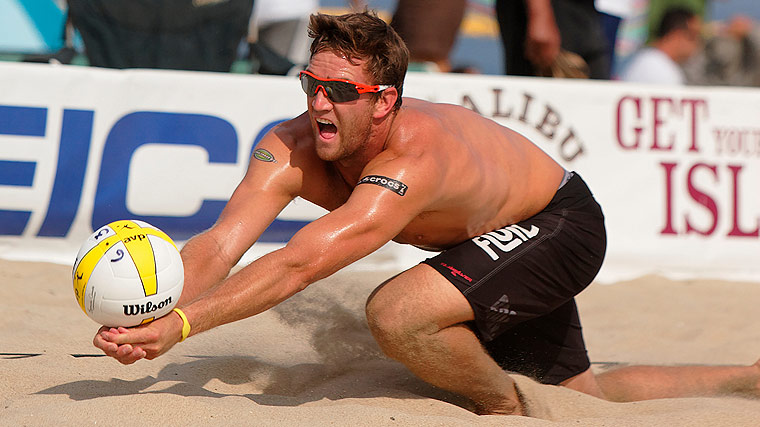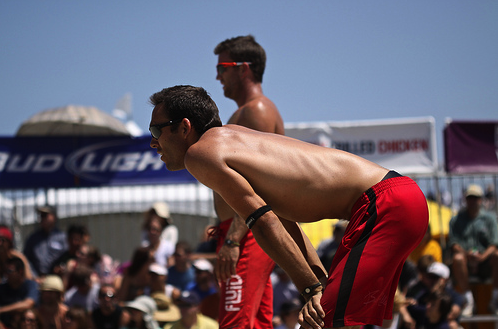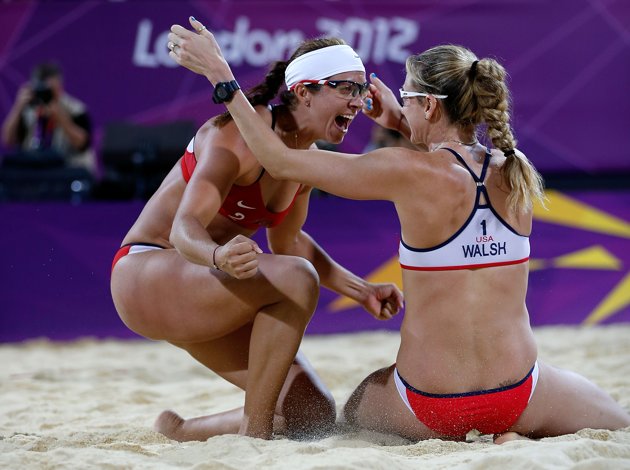A friend of mine, we’ll call him AJ, was riding home with his beach partner from a disappointing tournament in San Diego when his phone vibrated. It was a text message from a higher ranked player asking to play in the next tournament. AJ texted “Let’s do it!” and then told his now ex-partner, the driver, that he would be playing the next tournament with someone else.
The car pulled off the 405 freeway and AJ was told, “Get out of my car.”
AJ had to call his wife for a ride the rest of the way home.
I’ve had a lot of partnerships over my career and I’ve enjoyed every one of them. None were left on non-speaking terms or found me stranded on the 405.
My hardest breakup was with my longtime partner Braidy Halverson. We were doing well, climbing the ranks and after a couple seasons had some top 10 finishes. Towards the end of the season, Casey Jennings took a sabbatical and his partner Matt Fuerbringer asked me to play. Matt was a big-time player with a lot of experience who had won multiple tournaments. After a lot of debate, I dragged my feet over to Braidy’s house to talk to him. As with all the best breakups, we were sitting across from each other in his hot tub when I eventually broke the news. I thought he took it okay. He didn’t try to drown me.
But we still had one more tournament together in San Francisco where Braidy was, as he called it in a blog post, a Lame Duck Partner. Braidy barely showed up for our first match and we played awful, sneaking out a 19-17 win in the third set against a qualifier team.
I thought this was going to be a rough tournament but after a pep talk from Jeff Nygaard, Braidy snapped out of it. Nygaard told him he had to act like a professional and this was the time to prove himself to potential partners. Our next match was against the higher seeded Medel/Stolfus. Braidy played better than I’d ever seen him play and carried us to the win.

Nygaard had been right, too. At dinner that night Braidy received texts about playing from both Medel and Stolfus!
Take away: Don’t dump your partner until after the tournament is over. Or until you’ve been dropped off at home.
I’m going into the 2018 season with a new partner. I met with Dr. Peter Habrel, a sports psychologist who works with USA Volleyball, to pick his brain on what makes for successful partnerships. (Dr. Habrel will also be sharing his knowledge and the study he did on Beach Olympic partnerships in an upcoming Coach Your Brains Out episode.) Many of the following ideas came from my conversations with Dr. Habrel.
The stories making fun of Braidy are 100% mine.
Like Dr. Habrel or Dr. Phil will tell you, communication is important in any relationship. It’s important to be clear about what you both want and what your values are so you can go into the partnership with open eyes.
How do you prepare for matches? How do you warm up and scout? What talk helps when you’re in a funk or struggling? Should there be a cooling off period after a match or debrief right away?
I’ve never been the most open communicator. If something a partner did bothered me I’d usually just seethe inside and take it out on the voodoo doll with board shorts I made at home. If I’d been more mature I would have addressed some of these irritations and worked on a solution.
For instance, I have this crazy superstition where I like to warm-up for a match. While my partner Braidy would sometimes be MIA the minutes before a match. So, I would angry-pepper with a volunteer ball shagger not wanting to send him another nagging text.
Had Braidy and I had an earlier conversation where he said, “Hey, I feel and play my best when I get a massage in the player tent before the match while playing Words With Friends on my phone then stroll up after the coin toss and play,” I would have still been annoyed but at least I’d know that was his plan and I could stop sending my wife out to find him.

If you and your partner have established shared values, then it’s also easier to have a conversation if standards aren’t being met.
Every team in the history of sports claims to value “hard work.” If you’ve agreed on this as a core value, then you have a basis for a conversation when one of you wants to take days off or is slacking in practice or skipping gym workouts.
Some partnerships are more compatible than others. I think this has more to do with the shared values of the team than personality. We’ve seen lots of successful partnerships between extroverts and introverts or older and younger players. Just because one of you spends your nights in the hotel room reading Seneca and the other one watches music videos on their phone without headphones (Trevor Crabb), doesn’t mean you can’t sideout together.
 If you find your values don’t align, you have three options:
If you find your values don’t align, you have three options:
1. Break Up – It’s okay to break up. It happens a lot in our sport. If you approach beach volleyball like a professional then you will have to make tough business decisions. Just explain where you’re coming from and don’t burn any bridges. It’s a small community and there’s a chance you will play or practice with that person again.
Also, it’s better to break up in the offseason with plenty of time for both of you to find and train with new partners. The night of the tournament sign-up deadline is not advised.
2. Stay Together and Make Each Other Miserable – Some partnerships stay together and let animosity build up. On the road, I sometimes hear players complain about their partners. “He’s out of shape.” “She spends all night partying.” “He snores so loud I swear one of these nights I’m going to suffocate him with his own pillow.”
Keeping these partnerships together might even see good results—otherwise, they for sure would have broken up. But it makes for a long season and a long career. Beach volleyball should be fun. Better to play with someone you want to battle with.
3. Find Some Middle Ground – If your values don’t align but your partner is 8ft tall with a cannon jump serve and hands of gold, maybe you can deal with some of those differences.
This takes maturity. Understanding what you can control and what you have to let go of.
And what you can control is yourself. How hard you train and being a good teammate. You can’t control your partner’s actions but you can control how you react. This gap between the stimulus and your response is called maturity.
Also, traits tend to rub off when you lead by example.
Dr. Harbel specifically uses the word “values” and not “goals.”
I’ve heard a lot of players talk about the importance of goal-setting. Creating targets or external outcomes to strive for. And if writing Tokyo Olympics on your whiteboard or posting it on Instagram motivates you, go for it. But it’s your values day in and day out that really matter.

As Joshua Medcalf said about goals on our podcast, “I don’t want to hear your wish list. I want to know what you are committed to doing with your 24 hours a day to close the gap between where you are and where you want to be. What are you willing to sacrifice inside your 86,400 seconds every day to become the person you want to be.”
Winning a gold medal is out of your control. There are too many external factors at play.
Your values and how you choose to train and act are under your control.
So is being a good partner.

